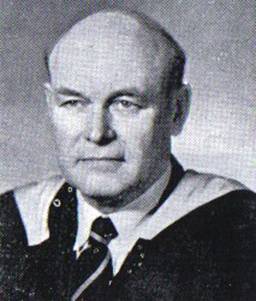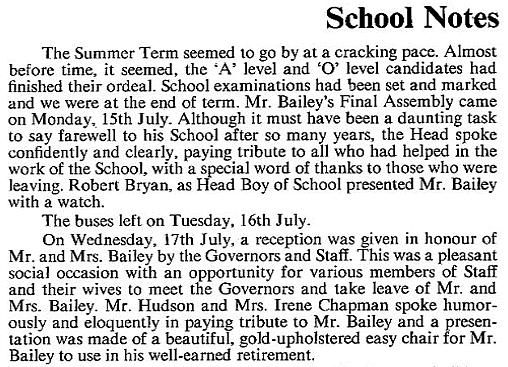| FOREWORD: Chris Snuggs - April 2018 |
I came across this in the "Janus" of 1974 and felt it was worth separating out, being such a beautiful tribute. It seems to me that WHS was exceedingly fortunate in its choice of headmasters, and Mr Bailey was there longer than any other. Each of us can only speak of his personal experience, but mine is that in all my contacts with the Bailey family I felt myself to be in the company of extraordinarly kind people of immense class - in the best sense of the word. Unlike others no doubt, I was never "sent to the Head" as it were, but I personally felt that the school's well-being (and thus my own in association) was massively enriched by the presence of him and his family. Finally, we may recall Mr Bailey's words in "Janus" from Autumn 1960; I am sure we all hope that he was in no doubt that his time at Woolverstone was indeed "a time well spent": G.H.B. - September 1960: "So we go into the next year with a mixture of pride and humility, of hopes and apprehensions, but essentially with quiet confidence and the prayer that "when our days here are ended, we may look back on a time well spent." |
 |
G. H. BAILEY ESQ. - from "Janus" in September 1974
 |
 |
Probably in few sorts of institution in this day and age does the nature of the man in charge make so much difference as in boarding-schools. Given a fair length of time in office, the school almost takes on the stamp of his personal character. Thus it is in no way surprising that there is an end-of-era feeling at Woolverstone now that Mr. Bailey has retired. We have a new headmaster, and things will be different - so much is certain.
G. H. Bailey’s tenure of office at Woolverstone was the culmination of a distinguished teaching career. He was brought up in the Fens and attended Spalding Grammar School, where he was an outstanding
pupil and is still remembered with affection. From Spalding he went up to St. John’s College, Cambridge to read English and Geography. He had played no rugby prior to his arrival at Cambridge, but progressed so far as to be awarded his blue in the University match against Oxford in 1932. (Cambridge lost - no doubt due to the fact
that G.H.B. - a wing three-quarter - never got the ball in his hands during the entire game.)
His first teaching post was at the Royal Grammar School, Newcastle. It was during his time here that he captained the Northumberland XV to victory in the County Championship. In 1944 he transferred to King’s School, Canterbury (where the renowned Shirley was headmaster) and ran the Geography department as well as being a housemaster and coaching the 1st XV. Some years later he accepted the headship of Dunstable Grammar School, where he remained until coming to Woolverstone in January 1959.
Bill Bailey has thus been headmaster of Woolverstone for about fifteen years: that is for approximately two-thirds of the school’s existence in its present form. The task of the first headmaster was to get the school established, to decide on its form and to set the style of institution it was to be. So it was that the first few years were ones of urgent activity, of many crucial decisions involving the determining of directions and the laying of foundations. On Mr Smitherman’s departure, the Governors saw that a period of consolidation was required, and they chose a man who would see the existing policies through to fruition. who would provide continuity and stability in a time of great social and educational ferment.
What then are the strong points of Mr. Bailey’s Woolverstone? One thinks first of the continuity of staffing. Woolverstone has a very small staff turnover - phenomenally small when compared with most London schools. Rumblings are heard (when are they not?), but the fact of it is that by and large the Staff have been able to find satisfaction in their work, and in that fact lies the key to the school’s success. G.H.B.’s method has been to appoint a man to a particular job and then to let him get on with it with a minimum of headmasterly interference. This has given plenty of scope for staff enthusiasms and initiatives, and has resulted in very high standards in many spheres, some of which have brought the school fame way beyond Suffolk or the I.L.E.A. It is also worthy of note that the staff enthusiasm extends to the welfare of the school itself. We really care about the place, and at no time is this more apparent than when things are going wrong. If the Staff were apathetic they would not care about high standards.
And the boys? Where is the breakdown in communications so often found in many a school composed of inner-city dwellers? Where is the seething discontent, the apathy, the vandalism? The amazing thing is that in this age of apathy and scepticism the boys at Woolverstone (most of them) actually like it here and are quite unfashionably enthusiastic when it comes to taking part in the many activities, or supporting a team. Not that the school is a holiday camp: exams are passed (by most) and talents developed. In the words of the Inspectors (1971), Woolverstone provides a “stable, vigorous and friendly atmosphere” for those who need boarding education, which is precisely what it was founded to do.
It must not be thought that G.H.B.’s regime provided no innovations. During a time when money has been almost continually short and any project has had to be argued in the context of the needs of I.L.E.A. schools as a whole, it is not to be expected that many new buildings would materialise, but items such as the new science block, the art-room extension and the purchase of various properties in the village have all come about, and eventually when any new housemasters’ houses are built, it will be as a result of plans formulated under Mr. Bailey.
Organisational changes there have been, too. The present proven system of all-agegroup houses, for instance, was one of Mr Bailey’s innovations in the early days. More lately, we have seen such things as the opening of the courtyard for certain sixth-formers and the establishment of the Council - both a reflection of changed attitudes and values in the school and society. Academically, one of the most significant changes brought about by Mr Bailey was the decision that all boys shall do an arts or a craft subject to ‘O’ Level. Others are less eye-catching but equally important: the gradual build-up of sixth-form numbers, the adoption of new curricula in certain subjects, the introduction of the C.S.E. in certain areas now that the school is becoming rather more broad in its intake.
The final word concerning Mr Bailey’s Woolverstone can perhaps again be left to the recent H.M.I.’s report, which speaks of the “balance, coherence and sense of purpose which pervades the community.” H.M.I.s are not given to hyperbole.
So now the Baileys are living a few miles away at Kirton, where their garden is large and hitherto neglected. No doubt as the years go by many an Old Boy will find his way there, and already we have seen familiar faces on the touchline. May Mr and Mrs Bailey have many happy years in retirement - if retirement you call it: we hear that G.H.B. is now teaching part-time in a girls’ school. The man must be a glutton for punishment.
David. J. Hudson, Deputy-Headmaster
Bailey G. H. |
Basher |
Head |
1948-1960 |
former Cambridge Rugby Blue and despite his nickname was a gentleman and a gentle man |